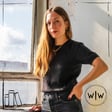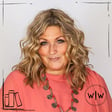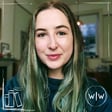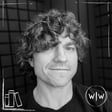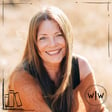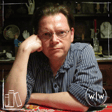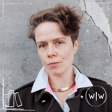Become a Creator today!Start creating today - Share your story with the world!
Start for free
00:00:00
00:00:01

#185 - Jess Popplewell
Young adult fantasy author and winner of the Times/Chicken House Chairman's Prize Award 2022 is on the podcast chatting about her debut novel, feeling like she sort of cheated her way into publishing and what careers advice she gives to people thinking about working in publishing.
💖 Join the Patreon 🙏
Support the show and get access to the extended cuts early and ad-free!
📚 The Chosen Ones and Other Tropes 🥳
Jamie, Melissa and Noami talk about all things writing, tropes and publishing!
✍️ WriteMentor 🧑🏫
Get a whole month with WriteMentor's Hub for free using the coupon code 'Write&Wrong'.
🎙️ Zencastr 🎬
Click on this referral link to get 30% off your first three months with Zencastr.
Transcript
The Importance of Writing Quality
00:00:00
Speaker
Ooh, a spicy question. I love it. Because the writing is sort of everything. You can fix plot holes, but if the writing... So some readers love that, and some readers are like, but I wanted more of this. So it's kind of a gamble.
Introducing Jess Popplewell and Her Award
00:00:14
Speaker
Hello, and welcome back to the Right and Wrong podcast. On today's episode, I am joined by YA fantasy author and winner of the Times Chicken House Chairman's Prize 2022, Jess Popplewell. Hello.
00:00:27
Speaker
Hi. um Thanks so much for coming on the podcast and chatting with me.
Jess's YA Fantasy Novel Overview
00:00:31
Speaker
ah Let's jump right in with the brand new book, your debut novel, The Dark Within Us, which has just come out. Tell us a little bit about it.
00:00:40
Speaker
um I should be good at this by now, shouldn't I? But it has only been out a day, so that's my excuse for having a moment of panic there. um The Dark Within Us is a YA fantasy novel about a 16-year-old girl called Jenny who is, when the novel starts, homeless. She is officially what we call sofa-surfing, so she's living on her auntie's living room sofa.
00:01:01
Speaker
And her whole world is kind of falling apart. She's recently split up with her boyfriend. She's fallen out with her best friend and she just thinks there's something wrong with her. And then she goes to a terrible house party and meets a demon who tells her she is right. There is something wrong with her. She doesn't have a soul, but he can help her get it back if she is willing to go into hell with him.
00:01:23
Speaker
Is that all just into hell? Yeah, just a little. It's a very cool cool premise. You set it up as if it's going to be a sort of down to earth drama and then it quickly turns into fantasy. But um what was the...
Inspiration Behind the Novel
00:01:37
Speaker
I feel like there's so many different points that this could have begun from. What was the jumping off point? What was the like initial idea?
00:01:45
Speaker
So I have a good marketing answer and a true answer. Okay, let's hear both and we can compare. The good marketing answer is that um i obviously I love stories, both classic and modern, and I often describe this book as being a cross between the 2007 to 2010 TV series Skins and also the 14th century epic poem, Inferno, from The Divine Comedy.
00:02:10
Speaker
um which makes it sound very clever and like I, ah you know, sort of had this brilliant idea of putting these these two things together. and But actually what happened is that Jenny, the main character in this book, is a significantly cooler version of me at 16. And i I left home at 16, I was quite young and I think since that time,
00:02:31
Speaker
I've wanted to explore what that felt like, and the emotional kind of things that you might process if something like that happens to you at that age. But I didn't want to do it in a really realistic way because um I love realism in things I read, but I'm not necessarily a realistic writer. So I wanted to do it in a fantasy setting.
00:02:53
Speaker
Okay, did it making it a fantasy setting, did that also sort of make it feel less personal, given that it sounds like quite a lot of this was taken from your own experiences? Yeah, the inspiration was definitely from my experiences, but I will say this is such a fictionalized version of that. and This is often what happens um that, you know, It started out as being a story a bit about something that happened to me, but Jenny is now completely, her situation's wildly different to mine. And that's not only because I put her in hell, but you're absolutely right. I think that helped me. um it's It's a great metaphor.
Title Change and Creative Process
00:03:29
Speaker
Yeah, and this came about because this you won the ah Chicken House Chairman's Prize. I did. Two years ago. when I read the announcement for that while I was just quickly looking you up beforehand and it said that you the novel was called All Hell. Yes. Is that yeah an old title? It is, yeah.
00:03:48
Speaker
oh okay okay so it went through some iterations during editorial and now it's so we really liked all hell um and i think the idea was just that it was it was maybe slightly more punchy, but not as kind of evocative maybe. um And The Dark Within Us comes from sort of, we went through a whole series of title ideas, some of them pulled from like Milton, some of them from and Dante, and and other parts of ah the divine comedy and trying to come up with what but kind of what sounds cool, but also what sums up the book best.
00:04:25
Speaker
yeah you know and so Amazing that you that you won that competition. had you Were you submitting to to sort of lots of competitions at the time?
The Long Writing Journey
00:04:33
Speaker
I actually wasn't. i'm So I have been writing this book on and off since I was 16. So it's been, you know, wow yeah a really long time. and And it was only sort of 2019 that basically what happened was Jenny spoke to me. She just said, I'm at this house party, get me out of here. And suddenly I knew how to start the book. And I had not known how to do that before. I'd gone through so many iterations of this.
00:04:59
Speaker
And it just sort of happened really quickly after that. um Partly helped by I did some writing courses, I made some writing friends um and it really sort of helped it come together. It definitely helped that I got a new job that meant I only had to work four days a week. So I had extra time to do it. um And it was, there was a period of time where I thought genuinely this will not be the book that is my debut. This is not going to get me an agent. This isn't going to get me a publishing deal. It's probably too weird. And and also, you know, there's all that advice about your, ah com you know, the the things you comp it to should be, you know, within the next, the last three years, they should be really modern. And mine were skins and I'm taking some further. So I was just thinking, maybe this isn't marketable.
00:05:49
Speaker
and but I've always loved chicken house books. Some of my favourite authors when I was younger came from them and I knew that they did this competition and I thought I'm not going to and enter loads of competitions but I do want to enter this one because it asks for a whole manuscript up front which means it gives me a reason to finish it and and that's the reason that I put it in and I sort of told myself If it doesn't go anywhere, that's fine. I'm not going to be upset about it. It'll be a great experience anyway. um And then every stage where I got these emails saying, just to let you know you've been shortlisted or you've been longlisted and then you've been shortlisted. I just kept thinking, are you sure? But it's been great.
00:06:29
Speaker
and say she It hasn't been a mistake. My name's Jess. You can just double check. That's awesome. I mean, that's a great way of sort of, because one of the things obviously about writing, especially when you're without an agent, without contractors, that there really is no deadline and it's very easy to procrastinate within your own little world. So to to set yourself a deadline like that, that's a great great way of like looking at it.
00:06:54
Speaker
I work very well to a deadline. I've been very clear with my agent now that if she would like to ah me to get things done, just to be aware, I'm a massive teacher's pet. So if you give me a deadline, I will actually want to get it done early. um So that works well for me.
00:07:08
Speaker
Oh, okay, okay, that makes sense. So that was two years ago. And two years is not an unusual length of time for a publication like this to to turn around because, I mean, we are, as you said, talking the day after it's come out. um Does it feel like an awfully long time since you kind of finished writing and editing it?
Understanding the Publishing World
00:07:29
Speaker
Yeah, I mean, it doesn't, it doesn't. I think it definitely helped that I felt like I kind of understood what to expect from the industry when I won, partly because I'm at my day job, I'm a careers advisor. And although at the moment, I don't work with um creative students, I used to work for a university where I worked with creative writing students. So I did actually spend quite a lot of time looking into things like the publishing industry to understand it.
00:07:53
Speaker
um And then I could say it was my day job, even though actually it was because I was also really interested. and But I think that does mean that I went in with quite realistic ideas of timelines and things. um the It does feel like a long time in some ways, but on the other hand,
00:08:08
Speaker
things are always happening. So you know you're waiting for edits or you know you're waiting for your copy editor to come back and complain about um how many swear words you've put in your manuscript. um Or you know that you're waiting for the cover design or whatever it is. um And I've been really lucky. I think Chicken House have been really transparent um and sort of kept me up to date on where we are in the process with things. So um although it has been a long time, none of it's felt like I'm just waiting around and I don't understand why.
00:08:39
Speaker
Yeah, just out of curiosity, what what is your sort of careers advice if if like ah someone came to you saying, oh, when i when I'm older, I would like to pursue a career as an author or in publishing?
00:08:53
Speaker
Well, it's difficult in some ways because um as well, with any creative industry, the first piece of advice or the question I ask in return is, what do you know about the industry? and Because I think people can have quite um poetic ideas of what these industries are like. um And, you know, we know, if you're involved in the industry, that there is rejection all the way down, it never stops. and but You might have to try a lot of things and expect to hear no's or not to hear anything at all, but that can be really disheartening if you're not expecting that. um So I think the the first thing that I would do is make sure that the person I was talking to really knew what they were letting themselves in for.
00:09:38
Speaker
And then depending on their personal circumstances. So for example, mine, as somebody who left home quite young, I didn't really have the luxury of kind of making this my main focus for a long time. This was why it's taken me so long um to get the book written because I've always had bills to pay. I've always had, you know, rent or, you know, um various other things. When I was at university, I had bailiffs chasing me for three years. So I couldn't focus on writing a novel until I had that organized. And I think that's the key thing is If you're interested in any of these industries, understand them, do your research, maybe talk to people who've already been there um so that you go in with your eyes open. And that's not to say that people shouldn't do it, even if they do come from maybe a less um traditional background, because I think we need more diversity, like diversity of thought, diversity of experience in these industries. But if you go in with your eyes open and you know what the barriers might be, you can come up with a plan to overcome those.
00:10:37
Speaker
yeah Yeah, but like there's very few authors who or can afford to do writing like this full time. Absolutely. um especially you know Especially if you're writing your first, second or or third book. I have heard this sort of there's a kind of sweet spot where if you've got five or six books out and you're still getting consistently getting book deals, that that's around where a lot of people start to think, maybe I can start transitioning this into my full time. Absolutely. And I think if if people want to do that, then what you've got to think about is, okay, so how long might it feasibly take me to get five books out? yeah And that's not, it is just, if I can be realistic about that, I'm not going to put myself in a negative position while I'm waiting for that to be right. I mean, I think that's probably true in
00:11:25
Speaker
even things like video game design or anything if like you know what the industry is know what the the realistic um chances are that you'll be able to survive um doing that and if you need to do a portfolio career if you need to write on the side and have a job that's not a failure you're still a writer doing that um It's just you being realistic and making sure that you keep yourself in a position where you've got the energy to write. Because I know if you've got no money it's always there in the back of your head and it can really get in your head when you're trying to write. So making sure that you're in a good position to be creative and not stressed at the same time I think has got to be one of the best things you can do for your career early on.
00:12:04
Speaker
Yeah, absolutely. I mean, having just said, oh yeah, once you've written five or six books, you could probably think about going full time. The realization of if you're traditionally publishing, that's look that's going to look like seven to 10 years yeah before you can consider.
00:12:20
Speaker
you know, even consider going full-time. um Let's get back on to you. This is your debut novel, as we as we mentioned. As your first experience, you've kind of touched on that you did have some knowledge from the sort of outside looking in of what it was like to to go through the sort of publishing industry. Having now done it, you know, all the way through from the inside, ah how did you find the whole process?
Support After Winning
00:12:45
Speaker
It's been generally really positive. i am I think I was quite lucky in some ways. I often, I mean, this is a joke when I say this, but I often joke that I cheated my way in by winning a competition, ah because I got my agent and my publishing deal all in one fell swoop. and And obviously, I know it wasn't really a cheat, but it does feel a bit like that.
00:13:03
Speaker
and And that was beneficial because it meant that when you come in via a competition as well, for a start, I wasn't on my own. um Sarah Harrison, who won the overall prize um at the same time I won the Chairman's Choice Prize, um has been really brilliant as a support. We text each other all the time to be like, is this normal? Is this what's happening with you? And I think having somebody to talk to about it who is going through the same thing as you is is really useful.
00:13:29
Speaker
And for the same reason, I'm very pleased that I'm part of a ah debut group of UK children's authors in 2024 on Twitter. And we're always in contact as well. but We go to each other's book launches, you know, it's a really lovely, and supportive group. And I think things like that have made it a lot better because that community, I think it is obviously a potentially isolating experience. And having that community has meant it hasn't been.
00:13:58
Speaker
Yeah. No, it's so nice that you have a sort of, um obviously that community as well, but you you have almost quite literally like a like a book sibling, like a publishing sibling that you two have kind of gone through almost the same process at the same time with the same publisher it stuff so yeah and Yeah. And similarly, I found other um authors that have been published via Chicken House um by Amy Jordan, who wrote All the Hidden Monsters.
00:14:23
Speaker
ah Again, it's like kind of, we sort of, we've started calling ourselves writing soulmates because we read each other's books and we were like, oh no, we, I feel like we both get this. and It's just unfortunate that she's from the wrong side of the Pennines because otherwise she'd be a flawless companion.
00:14:39
Speaker
Oh, okay.
00:14:42
Speaker
um And how did you find, and I know that every editor that I've spoken to have been so kind of lovely and warm and talented, and but regardless of like how kind of nice an editor can be, I think that phase, especially for like, if it's not something you've done heavily before can be very, very challenging for an author. How did you find the editorial phase?
00:15:06
Speaker
Again, in some ways I was lucky, because my agent had read the book as part of the judging process, she warned me in advance that there was one element of my book that it was likely I was going to be asked to change, which was there was a subplot that basically ran parallel to the rest of the plot, so it didn't need to be there.
00:15:25
Speaker
And I don't think the overall book has ah lost anything by losing that subplot. But that was the biggest thing they asked me to do was just to delete that 15,000 word piece of text. And if I hadn't known in advance, I was going to be asked to do that. I think I would have really struggled because it involved a character that I adored and I was quite sad to lose him from the book. and But because I'd already been told it might happen, I was prepared. right And I just said to myself, I don't want to keep it, you know, I don't want to and let that upset me or anything. I think also I definitely have this attitude when it's your first novel that like I want to be relatively easy to work with these people that are helping me with the book know what they're talking about they've done this before so I've just I tried to be really open-minded and I was incredibly lucky with all of the editorial support that I had and from Chicken House that they recognized that I this is the first time I've ever done this and also that you know I had a day job as well so they were
00:16:23
Speaker
really, I think, sensitive to things like how much time it might take me to do something or, and you know, definitely doing that criticism thing of letting me know what they liked as well. So they were very sensitive to my poor little authorly feelings. Well, that's great. And your the your agent is Louise Lamont. Yes. And and wishes she was a judge that year for the competition. She was, yeah.
00:16:47
Speaker
Okay. so So how did that work? did Did she contact you after the competition to say, obviously once it'd been announced that you'd won the chairman's prize to say like, oh, I'd like to represent you on this book deal that you're now going to do through the comput competition. Yeah. So it was part of the terms and conditions of the competition that part of the prize is an author of representation from i say who whichever agent is on at the panel.
Securing an Agent
00:17:13
Speaker
And when I spoke to her, so we had a phone call, I think a week or two after the announcement. um And I remember she was very lovely. And she said, you know, you don't have to accept that if you don't want me to be your agent, um you you are allowed to say no, or you could use this as an opportunity to reach out to other agents and and kind of, you know,
00:17:32
Speaker
talk to a couple of us. But I she had already been on my list of people I would have considered um sending the book out to if I was querying. And the reason I hadn't sent it to her was because I knew she was a judge on the prize. So actually, I was quite happy with this outcome. Anyway,
00:17:49
Speaker
and And I was very clear. I did also say to her, I just want to clarify that the same also applies to you. If you secretly don't like the book, please don't feel that you have to. um And obviously she she put that to rest quite quickly. She was like, no, I definitely would like to represent you.
00:18:05
Speaker
That's good because I yeah i think it's ah it's a difficult situation when, and I imagine it a lot of these competitions do come with an offer of um an agent contract. And then there are probably some rare situations where one or both parties actually were not that into that partnership. And I think if ah if an agent and an author are not on the same wavelength,
00:18:29
Speaker
it's almost you need to like nip that in the bud because it's it's it's almost better not to have an agent than to have an agent who's not aligned with you. Yeah and I think when you're new to this industry and maybe you've never had an agent before you don't always know what you're looking for so you just want to say yes to the first person because oh it feels good that somebody wants to work with me. um I was very lucky in that first phone call with Louise we just ended up talking for a long time about about obscure books and tv shows that we both watched and it felt like a good match um
00:19:00
Speaker
and you know And the fact that she seemed to get what I was trying to achieve with the book as well, even though she obviously didn't need to help me get it ready for submission or anything because it already had the um the deal from Chicken House, but it still i had a good sense that she understood what I was trying to to do. And that was um kind of the reassurance that I needed that it was going to be a good fit. And I will say, I think she has been the best value part of the prize. She is brilliant. So I'm very happy with how this has turned out.
00:19:28
Speaker
Okay, amazing. had you Prior to like entering the the competition, had you done any rounds of submissions to agents? I tried. I've done a couple. um I hate it. um yeah If I yeah if i'd never have to do that again, that would be great. um I think I've sent, ah in my most recent iteration of this book, I think I've sent eight out and I'd had two very lovely personalised rejections, which I insisted on taking really positively because of a personalized rejection is, you know, a coup in itself. um And then I hadn't heard back from the others. And I'd thought at that point, um I might do more after if I found out about this competition. So I had yeah i hadn't done like waves and waves, um which I'm very grateful for.
00:20:17
Speaker
Yeah. And that is, yeah, I mean, I guess in the back of your mind somewhere, given that you'd considered submitting to Louise anyway, there was probably a part of, in the back of your mind, this was all a master plan for you to get signed by Louise. Oh, absolutely. Yeah, it was really well organised. I thought it all through exactly like that.
Book Recommendation: 'Broken Stars'
00:20:40
Speaker
um Amazing. Let's head over to, it's about that time, we should go to the desert island and I will ask you Jess, if you were stranded on a desert island and you had one book with you, which book do you hope that it would be?
00:20:55
Speaker
um I'm going to be really contrary. I thought about this question a lot and I'm going to pick a book of short stories because that way I get multiple stories to choose from depending on my um kind of mood. And one that I've really enjoyed in the past couple of years that I would think I would quite happily read multiple times again is called Broken Stars. It is 16 stories um it from Chinese science fiction edited and translated by Ken Liu and it is really great. It's a fantastic book.
00:21:25
Speaker
Oh, okay. That's a really cool choice. um Yeah, I think youre I've had people do collections of poems and things like that. But ah yeah, a collection of short stories, give yourself lots of different things, depending on your mood, flick onto a different short story. Yeah, I love i love short stories. that I actually think a lot of the time when I'm reading short stories, I either like fantasy or science fiction because I think one of the things I like the most about a short story is that it is a snapshot in time. It is not necessarily um a ah narrative that needs to have a definitive end point. You can read it and then spend a few hours afterwards thinking what would be the next thing that would happen? What else might be true of this tiny world that we've just found out about?
00:22:09
Speaker
um in this, you know, short space of time. And I think particularly science fiction stories are a really interesting ah thought experiment to do. Yeah, yeah. Because I mean, most people will be familiar with the short stories of like Isaac Asimov or Philip K. Dick. And like, yeah, I mean, within science fiction specifically, its short stories are such a huge part of that genre. Yeah, absolutely.
00:22:33
Speaker
Um, I have got some questions about, um, promoting and and marketing as an author, as well as, uh, your upcoming appearance at Yalk. Um, but that's all going to be very exciting, but that's going to be an extended cut exclusive to my amazing Patreon subscribers. Oh, my hands are tired. I must buy these books. yeah um Amazing. Well, very exciting. I'm excited for that. I hope it goes well. I'm sure it will. um It's been so great chatting with you, Jess. Thank you so much for coming on the podcast and telling us all about your your debut novel, The Dark Within Us, which is out right now in all the usual places. um Yeah, thanks so much.
Follow Jess Online
00:23:14
Speaker
Thank you very much. It's been delightful.
00:23:15
Speaker
And for anyone listening, if you want to keep up with what Jess is doing, you can follow her on Twitter, Instagram, and TikTok at JessPops. That's P-O-double-P-S. Or you can head over to the website, JessPoppelWorld.com. To support the podcast, like, follow, and subscribe. Get extra content at Patreon dot.com slash right and wrong, and check out my other podcast, The Chosen Ones and Other Troves. Thanks again, Jess, and thanks to everybody listening. We will catch you on the next episode.

